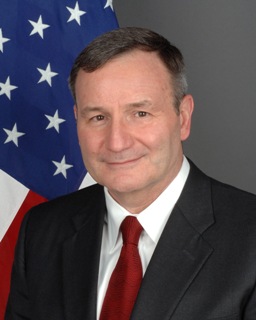A set of leaked classified documents released today by the New York Times shows the extent to which US Ambassador to Afghanistan Karl Eikenberry opposed the escalation of the war in Afghanistan.
 Ambassador Eikenberry, a retired general himself, detailed what he sees as major flaws in the strategy of General Stanley McChrystal, warning it would lead to “vastly increased costs and an indefinite, large-scale US military role in Afghanistan,” and cautioning that the administration hadn’t examined every alternative.
Ambassador Eikenberry, a retired general himself, detailed what he sees as major flaws in the strategy of General Stanley McChrystal, warning it would lead to “vastly increased costs and an indefinite, large-scale US military role in Afghanistan,” and cautioning that the administration hadn’t examined every alternative.
Though he conceded that the escalation might have some benefit in near-term counterinsurgency, he argued that it might actually do serious long term damage to the war effort by making the Karzai government even more dependent on the international occupation force.
The memos serve as a scathing indictment of the Karzai government, as the ambassador declared President Karzai “shuns responsibility for any sovereign burden” and would be happy to see US troops there forever. He cautioned that with Karzai’s reelection he would be even more set in his ways and the escalation would only reinforce his government’s belief that America is there for a “never-ending war on terror.”
Though it had been long known that Eikenberry had opposed the surge, the details surrounding his opposition had remained murky and it certainly had never been revealed to what lengths he had lobbied against it.
Yet in the end the Obama Administration rejected Eikenberry’s assessment, announcing in December a commitment of between 30,000 and 35,000 additional troops. Eikenberry has since predicted that the war will continue “long after 2011.”





that is what the Generals want, Job Security.
Alexander the Great (the greatest military leader of ALL time) had difficulty taking his army through Afghanistan on the way to India – Ghengis Khan conquered the country but could not hold onto it – the British suffered a major defeat and loss of a regiment in Afghanistan – the Russians had over 100,000 men in Afghanistan and suffered defeat – BUT – with all of the arrogance that can be possinly mustered, the U.S. is going to accomplish in Afghanistan what NO other army has ever done? – you think? – really? As Mao was to have observed and said: "It is easy to defeat an arrogant enemy." As 'Rambo' was warned: "May God protect us from the teeth of the tiger; from the venom of the cobra; and from the vengeance of the Afghan." – it was just a movie – yes, just a movie! As the saying goes: "Genius has its limits but stupidity has no limits" – it is as stupid as stupidity gets for the U.S. to be in Afghanistan.